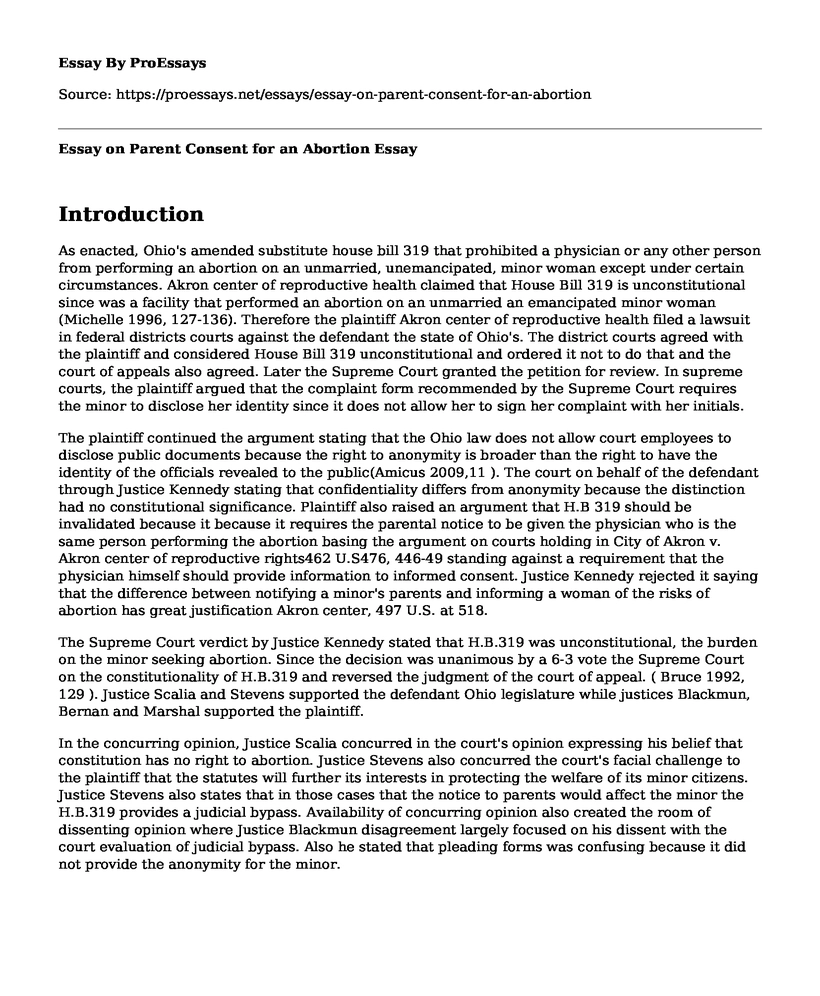Introduction
As enacted, Ohio's amended substitute house bill 319 that prohibited a physician or any other person from performing an abortion on an unmarried, unemancipated, minor woman except under certain circumstances. Akron center of reproductive health claimed that House Bill 319 is unconstitutional since was a facility that performed an abortion on an unmarried an emancipated minor woman (Michelle 1996, 127-136). Therefore the plaintiff Akron center of reproductive health filed a lawsuit in federal districts courts against the defendant the state of Ohio's. The district courts agreed with the plaintiff and considered House Bill 319 unconstitutional and ordered it not to do that and the court of appeals also agreed. Later the Supreme Court granted the petition for review. In supreme courts, the plaintiff argued that the complaint form recommended by the Supreme Court requires the minor to disclose her identity since it does not allow her to sign her complaint with her initials.
The plaintiff continued the argument stating that the Ohio law does not allow court employees to disclose public documents because the right to anonymity is broader than the right to have the identity of the officials revealed to the public(Amicus 2009,11 ). The court on behalf of the defendant through Justice Kennedy stating that confidentiality differs from anonymity because the distinction had no constitutional significance. Plaintiff also raised an argument that H.B 319 should be invalidated because it because it requires the parental notice to be given the physician who is the same person performing the abortion basing the argument on courts holding in City of Akron v. Akron center of reproductive rights462 U.S476, 446-49 standing against a requirement that the physician himself should provide information to informed consent. Justice Kennedy rejected it saying that the difference between notifying a minor's parents and informing a woman of the risks of abortion has great justification Akron center, 497 U.S. at 518.
The Supreme Court verdict by Justice Kennedy stated that H.B.319 was unconstitutional, the burden on the minor seeking abortion. Since the decision was unanimous by a 6-3 vote the Supreme Court on the constitutionality of H.B.319 and reversed the judgment of the court of appeal. ( Bruce 1992, 129 ). Justice Scalia and Stevens supported the defendant Ohio legislature while justices Blackmun, Bernan and Marshal supported the plaintiff.
In the concurring opinion, Justice Scalia concurred in the court's opinion expressing his belief that constitution has no right to abortion. Justice Stevens also concurred the court's facial challenge to the plaintiff that the statutes will further its interests in protecting the welfare of its minor citizens. Justice Stevens also states that in those cases that the notice to parents would affect the minor the H.B.319 provides a judicial bypass. Availability of concurring opinion also created the room of dissenting opinion where Justice Blackmun disagreement largely focused on his dissent with the court evaluation of judicial bypass. Also he stated that pleading forms was confusing because it did not provide the anonymity for the minor.
Conclusion
In conclusion, my opinion on the parental consent on an abortion is that parental consent is important to the minor because the parental advice will be both compassionate and mature therefore striking down the risk of abortion.
Work Cited
American Psychological Association. "Amicus curiae brief filed in US Supreme court in Ohio v. Akron center for reproductive health, Inc., 497 US 502 (1990) and Hodgson v. Minnesota, 497 US 417 (1990)." Retrieved February (1989): 2009.
Oberman, Michelle. "Minor rights and wrongs." The Journal of Law, Medicine & Ethics 24.2 (1996): 127-138.
Ambuel, Bruce, and Julian Rappaport. "Developmental trends in adolescents' psychological and legal competence to consent to an abortion." Law and human behavior 16.2 (1992): 129.
Halva-Neubauer, Glen. "Abortion policy in the post-Webster age." Publius: The Journal of Federalism 20.3 (1990): 27-44.
Cite this page
Essay on Parent Consent for an Abortion. (2022, Jun 05). Retrieved from https://proessays.net/essays/essay-on-parent-consent-for-an-abortion
If you are the original author of this essay and no longer wish to have it published on the ProEssays website, please click below to request its removal:
- Healthcare Study Analysis Example
- Paper Example on Political Advocacy in Health Promotion
- Autophagy-Related Protein Expression Paper Example
- How Would the Nurse Actualize Parse's Theory of Human Becoming?
- Research Paper on Growth & Development: How Childhood Nutrition Shapes Life as an Adult
- Exercise Improve Alzheimer's Outcomes? - Annotated Bibliography
- Essay Sample on HPV Education and Vaccination







